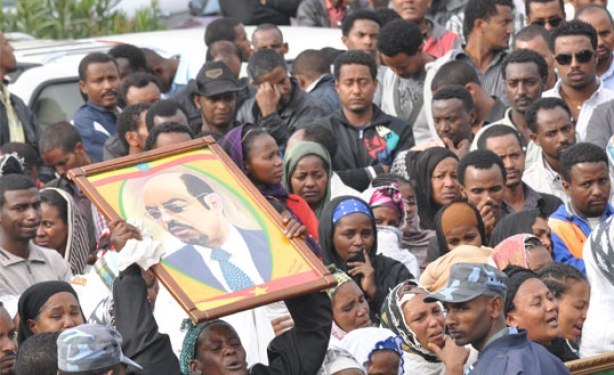ANALYSIS:
The long period of uncertainty over the death of Ethiopian Prime Minister Meles Zenawi ended on Monday, when it was officially announced that he had passed away in a Brussels hospital at the age of 57.
Rumours about the death of the Ethiopian leader started in July when it became apparent at public appearances that he had lost a great deal of weight, and especially when it came to light that the he was outside the country in search of medical attention. The growing intensity of the rumours, however, led to official responses in which the gravity of his ill-health was downplayed. This has led to speculation as to whether the prime minister really died on the day announced or if he had died earlier and it was kept secret.
The announcement of his death has been met with mixed responses. A section of Ethiopians feel the country has lost a visionary leader who should have lived long enough to finish as well as witness the impact of his policies on the country. Some African leaders also express the same sentiment, including President Ellen Johnson Sirleaf of Liberia, who has described the late Ethiopian leader as an economic transformer and a strong intellectual African leader.
British Prime Minister David Cameron called him an 'inspirational spokesman for Africa' who contributed to his country's development by 'lifting millions of Ethiopians out of poverty'. While sharing similar sentiments, other leaders, including Prime Minister Raila Odinga of Kenya, expressed fears about Ethiopia's post-Meles stability.
Speaking on behalf of Al-Shabaab, Sheikh Ali Mohamud Rage is quoted to have expressed the gladness of his group to hear about the death of the prime minster, adding that '… Ethiopia is sure to collapse'.
Since announcing Prime Minister Zenawi's death, the government has been under the control of the Deputy Prime Minister, Foreign Minister Hailemariam Desalegn. This is in line with the 1995 constitution of the country, which provides in Chapter 75(1)b for the deputy prime minister to act in the absence of the prime minister. The constitution gives the House of People's Representatives the duty to elect the new prime minister, in Chapter 73.
This implies that while the deputy could act in the interim, it will be up to the House to decide whether he should remain at the helm or if a new prime minster will be elected.
While Prime Minister Zenawi had a questionable human rights record, it cannot be denied that he has left a legacy in terms of Ethiopia's economic development. The development that took place under his rule enhanced the lives of many Ethiopians, even though the opposition argued vehemently that it did not necessary amount to economic empowerment for all. Under his leadership, the country achieved enormous economic growth and became one of the preferred destinations for investors and foreign development partners in Africa.
He will therefore be remembered for his contribution to the development of the political, economic and geopolitical history of Ethiopia in recent times. Ethiopia has long been a closed and secretive society, but under Prime Minister Zenawi the country did start engaging with the West.
He became a strategic ally of the West in the war on terror, with his country playing a vital role in intelligence gathering on terrorism in the Horn of Africa and sharing this with the United States. In Somalia, particularly, he played a leading role in the military engagement that pushed the Islamic Union Court from Mogadishu and fought Al-Shabaab. His legacy also includes the ethnic federalism of Ethiopia, and the bitter war fought between his country and Eritrea.
Now that Prime Minister Zenawi has passed away, questions are being raised about whether the positive developments will be sustained and whether his sudden death might not open up the body polity of Ethiopia to parochial politics, which could destabilise the country.
An ethnic minority has ruled Ethiopia for decades, and thus another concern is that other ethnic groups may take this opportunity to overthrow the current government. Overall, however, the possibility of a destabilisation does not appear to be likely in the short term. This is because most of the state security infrastructure is still intact and operational.
The crucial issue, however, revolves around the nature of the politics within the ruling coalition. The existing coalition is made up of four parties – the Tigrayan People's Liberation Front (TPLF), the Oromo People's Democratic Organisation (OPDO), Amhara National Democratic Movement (ANDM) and the South Ethiopian People's Democratic Front (SEPDF).
Given the largely ethnic nature of the politics and federal composition of the country, these parties are based on ethnicity. In the event that these groups are not able to hold their coalition together, the possibility of disintegration at party level, with severe repercussions, is likely. There is also concern over whether Ethiopia's relations with its neighbours may deteriorate.
This year, a number of African leaders have died, including John Atta Mills of Ghana and Bingu Wa Mutharika of Malawi. This raises the question as to whether leaders should disclose more information regarding their health status. With Prime Minister Zenawi's death, Africa has lost one of its major pan-Africanists, a tall figure in the security landscape in the Horn of Africa, and someone who contributed immensely to finding peace not only in Somalia but in Sudan as well.
Institute for Security Studies (Tshwane/Pretoria)



